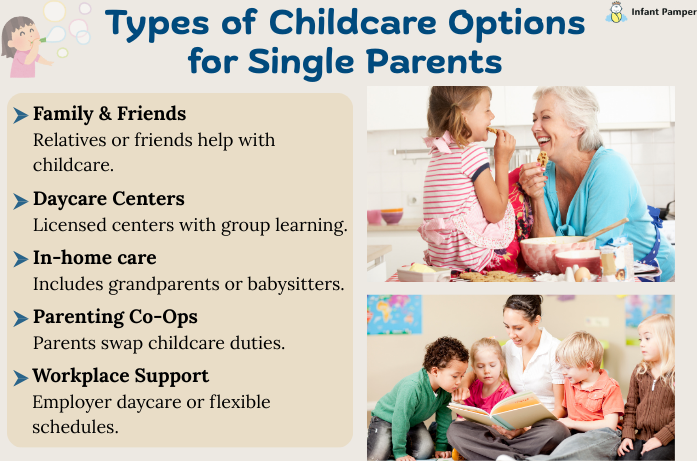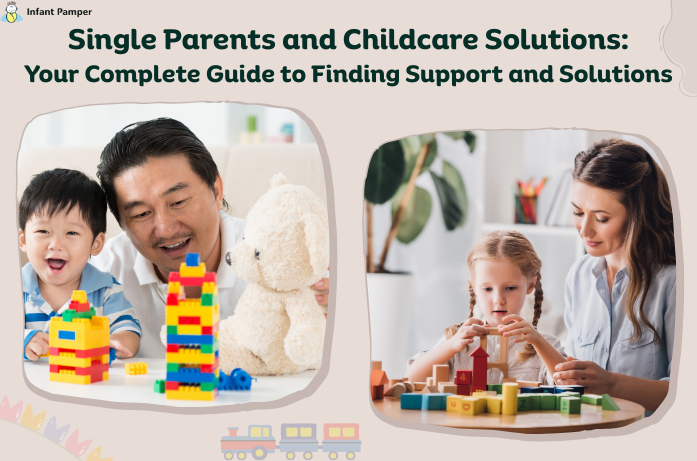Life is a balancing act on the tightrope for any single parent, balancing work, finances, and the child’s well-being. Managing all of this is often too much on one’s plate. Therefore, your strength is still admirable even though you are handling one of the most toughest and rewarding jobs in life.
At Infant Pamper, we see you. We know that it can be hard to land on the perfect childcare Solutions. Here is a guide to lay out practical solutions and resources that will enable you to create a secure and nurturing environment for your little one. We want to empower you and help in support for which your family deserves.
The Unique Challenges Single Parents Face
Single parents juggle multiple roles, caregiver, provider, decision-maker, and emotional support-with rare assistance. This results in some common challenges:
- Limited time, few opportunities for personal downtime
- Financial strain, especially with growing childcare costs
- Emotional exhaustion and burnout
- Not-so-great support systems, especially for emergencies
- Guilt, feeling split between earning and being present, going back and forth
These struggles are real and valid; they don’t make one a bad parent but mark the heavy burden of doing it all alone. Research from the Urban Institute highlights that improving access to childcare subsidies, job training, and affordable housing are crucial to support the economic mobility of single parents.

Types of Childcare Options for Single Parents
When you’re the only one handling the everyday care stuff, then having the right childcare arrangement is not just helpful but instead is a necessity. Here are some viable options.
1. Family and Friends Network
Your close set of people can offer a cheap childcare alternative.
- Try having the grandparents, aunts, uncles, or close friends officialize childcare support during your working hours, school holidays, or during an emergency.
- Create a consistent schedule that respects their time but also gives you some needed relief.
Tip: Consider using a shared calendar app to stay organized and avoid confusion at the last minute.
2. Daycare Centers
Childcare centres are supervised professional care settings, with regimented schedules for group learning and peer interaction.
- Consider centres with flexible time and perhaps extended hours to fit your schedule.
- Ensure that the center is licensed, safety-compliant, and employing qualified caregivers.
- Check reviews about the centre as well as inquire about caregiver-to-child ratio and curriculum plan.
According to National Center for Biotechnology Information, quality daycare enhances brain functions during early formation, social skills, and emotional well-being.
3. In-Home Childcare
In-home care is much more personal, well suited to irregular working shifts or babies/neonates requiring extra attention.
- Look for caregivers with babysitting experience, CPR training, and solid references.
- Always do background checks and trial visits before hiring.
- Consider part-time or shared nanny services to make it more affordable.
This enables the child to stay in an environment he or she recognizes as safe.
4. Parenting Co-Ops
Childcare co-ops are cooperative associations in which the parents take turns to watch each other’s kids, thereby lessening the costs while creating the community.
- A good option for stay-at-home or part-time working parents.
- These setups nurture trust, collective responsibility, and social interaction for kids.
- It’s a great network to bond with like-minded parents who will offer emotional and logistical support.
Check out your local community centers, parenting apps, and forums to start or join a co-op.
5. Workplace Childcare Support
Employers can provide benefits that support working parents through their childcare needs.
- Ask HR if your company offers on-site daycare, childcare subsidies, or emergency backup care.
- Look for bliss in telecommuting, varied schedules, or compressed schedules.
- Even small accommodations can reduce stress and improve your parenting routine.
Balancing work and parenting becomes easier with a supportive employer.
Checklist: Finding the Right Childcare
Here’s a quick list of what to check before choosing a childcare provider:
- Are they licensed and trained in first aid?
- Do they have references from other parents?
- Are they flexible with timing?
- Do they follow child-safe protocols (hygiene, food, naps)?
- Will they communicate daily updates?
- Is the environment clean, safe, and stimulating?
Managing Mental Health and Burnout
Choosing childcare is an important decision, but it is equally important to consider the mental health of the parents. Parenting by one person means that the parents are the foundation of the whole family. If you break up, everything seems unstable. Therefore, the hurting spirit of the parents is not just a personal need, but a means of parenting:
- Comfort is not a luxury but a lifeline.Moments count: 10 to 15 minutes spent relaxing, stretching your legs, drinking tea, taking a short walk, or taking a moment to breathe deeply can ease your fatigue. Remember, small breaks go a long way.
- Talk it out. Single-parent support groups and counselors offer relief, clarity, and validation. You need not carry your burdens alone.
- Aim for good enough. Forget the pressure of being perfect. Being there for your child, loving them, and consistently being an example is way more important than doing it all.
According to UNICEF, children flourish in homes where warmth, empathy, and consistent boundaries create a nurturing environment, while the Journal of Law, Economics, and Education emphasizes that engaged parenting practices build resilience in children.
So in short: Taking care of yourself sets a wonderful precedent of self-worth and emotional health for your child. That speaks volumes about parenting.
Money-Saving Ideas for Childcare
Childcare can be very expensive, so all the more so if you are a single parent. But, the good news is, you have a handful of strategies to save some bucks:
- Government Assistance: Many countries and U.S. states provide childcare subsidies or vouchers for low-income families. However, studies show that 79% of single-parent families face difficulties accessing affordable childcare, often because of childcare deserts (Equitable Growth).
- Lower-Cost Daycares: Some daycare centers work him a sliding fee scale, which means the fees are set based on how much you make.
- Tax Benefits: Keep in mind that while filing your tax returns, you should always claim the childcare tax credits that you could qualify for. This would go a long way in reducing the amount of taxes that you pay.
- Part-Time or Drop-In Care: You do not always need full-time daycare. Some centers allow you to pay just for the days or hours you use; that can really add up to savings.
Side note: Call your local child welfare office or a community center to find out about trusted and inexpensive daycare options in your neighborhood.
Building a Support System
No parent should ever feel alone, even if they are the only adult in the house. Here are some ways to create your own village:
- Join parenting forums or local groups
- Attend community events for parents and kids
- Connect with other single parents online or at school functions
- Don’t hesitate to ask for help
The American Academy of Pediatrics notes that building a reliable support network reduces stress and improves parenting outcomes, while studies like Resilient Parenting: The Impact of Single-Parent Childcare Practices highlight how single parents worldwide adapt and strengthen family resilience through shared community practices.
Teaching Children Independence
Sometimes childcare is about teaching the child to play or function independently, albeit briefly. This holds especially true for the older toddlers or preschoolers.
- Use educational toys and puzzles or just play an audiobook.
- Keep away any sharp objects and dangerous things for a child in their play area.
- Teach children about structured “quiet time” using timers as time cues.
Tip: This contributes to their cognitive and emotional development, a win-win situation!
Final Words for Single Parents
The world has many kinds of beauty and creativity, but nothing can be more worthy or compelling than a single mother and child standing together, embracing strength, resilience, and unconditional love. Every diaper changed, every bottle prepared, every story read, every decision made, is a step forward in the very life of that child-you are doing way more than enough.
Remember, there are countless variations; hence there cannot be a one-size-fits-all childcare solution. The best one is the solution that works best for you, your personality, and current situation. Help from family, the trustable daycare, a local co-op, or a mix of solutions-every path is acceptable.
More importantly, remind yourself to take care of your wellbeing along the road. A parent who is supported may better raise a happy, well-rounded child. And on those tough days, here is a little reminder: you’re doing a great job, and you are never alone.
FAQs for Single Parents and Childcare
Q1: What type of childcare is best for single parents?
There is no single best option! Many combine daycares with family support or in-home care.
Q2: Are there any Free or discounted child care options?
Yes, if you can find government subsidies, sliding scale daycares, and parent co-ops.
Q3: How do I find trusted childcare?
Give it a recommendation, online reviews, or better meet providers personally.
Q4: Can I get assistance for childcare if I work night shifts?
A Support-giving nanny or family member, or even a 24-hour daycare center if suchexists.
Q5: How do I deal with stress as a single parent?
Taking a water break, talking to a support group, and just going with “good enough” parenting, it’s fine not to be perfect.
Parenting alone does not mean parenting without support. At Infant Pamper, we believe every parent deserves guidance, resources, and community. Browse through more guides on our website, tie up with other parents, and remember you are never alone on this journey.




